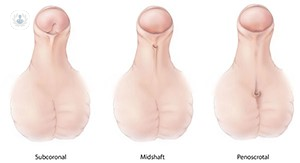Hypospadias and other common penile abnormalities in babies
Written in association with:Hypospadias is a common condition, affecting around 1 in 350 male births. It is an abnormality of the penis, where the opening of the penis where the wee comes out (urethral meatus) is not at the end of the penis, where it should be, but positioned on the under surface of the penis.

The most common location of the meatus in cases of hypospadias is the corona (the junction between the glans and shaft), but the opening could also be located along the shaft or down in the scrotum.

What causes hypospadias?
Hypospadias is often associated with a bend (chordee) or twist (torque) of the penis, and an abnormal (described as ‘hooded’) foreskin.
Referral to a paediatric urologist is required in order to discuss surgery. Minor degrees of hypospadias may be of no functional consequence, and hence will not require surgery. In more severe cases, surgery is indicated to ensure the boy will be able to wee standing up, and that he has straight erections when he grows up.
Treatment for hypospadias
Hypospadias does not affect future continence or fertility. In most cases the repair may be performed as a day-case procedure under general anaesthetic, meaning your child will not be required to stay in hospital overnight, and can return home the same day as the procedure. More severe degrees of hypospadias will require a complex surgical repair in at least two stages, 6 months apart. Surgery is usually recommended from 9 months of age.
Penile chordee/torque or a hooded foreskin may be present without a hypospadias. In these cases, your paediatric urologist will advise you on management options.
Other penile abnomalies include penoscrotal tethering (or ‘webbed penis’), congenital megaprepuce (excessive layers of foreskin resulting in ballooning and urinary retention). Referral to a specialist is recommended in all cases.
If you are concerned about an abnormality in your child’s penis, make an appointment with a consultant paediatric urologist.


